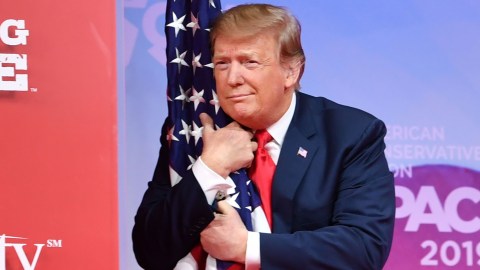10 reasons there should be a maximum age limit to run for president

- As there’s a minimum age, there should be a maximum one.
- Aging causes decline in numerous cognitive skills as shown in numerous studies.
- Older candidates are less likely to support new ideas, technologies and societal changes.
Look, this is not meant to be ageist. But as we have a minimum age to become president – 35 – there should be a maximum age too. Why 35 anyway? Who determined that 35 is the age you have mature enough ideas and know enough about the world? So a younger person is not able to have good ideas before then?
Of course that age limit comes from the founding fathers who drafted the Constitution. They somewhat arbitrarily calculated that 35 was the age you’d achieve competency in life and be ready to rule a nation.
What should be the top age limit to run for president? For one the retirement age is 66 – maybe that’s a good cutoff point after which we shouldn’t have to contend with people trying to take on what is likely the hardest and most demanding job in the world.
To look at this further, here are top 10 reasons for why we should have a maximum age to become president –
As a society, we value age. Older people are supposed to have the knowledge and the experience. But is that enough in a position that requires one to react to thousands of variables in an increasingly-complex world where missteps can lead to global catastrophe?
A 2015 study carried out by MIT’s Joshua Hartshorne and Laura Germine from Harvard found the different ages when our brains are their utmost. The majority of mental processing skills like memory, pattern recognition, and reacting quickly peaked from around the late teens into the 20s. Other components of such ‘fluid intelligence” peaked as late as 40. Certain life skills like the ability to recall people’s emotional states were at their strongest in the 40s and 50s. General knowledge and comprehension peaked by 50. Vocabulary, which is a measure of accumulated intelligence, actually peaked into the late 60s and early 70s.
When does the brain’s power start to decline? After reaching their full potential in the 20s, the processing functions like strategic memory that helps recalling names and numbers start to decline during that same decade. Tasks found to be sensitive to aging, getting worse over time, include simple and choice reaction times (RTs), tasks involving working memory, tests of episodic memory as well as spatial and reasoning abilities, mental rotation, and visual-search performance. Some studies show that a third of older people struggle with declarative memory (retrieving facts or events) while about a fifth do as well on cognitive tests as 20-year-olds.
One big cognitive ability that has been proven in various studies to decline with aging is the ability to pay attention to more than one task at once. “Although dual-tasking is already difficult enough for younger adults, it apparently is even more difficult for older adults,” states the 2017 paper by psychologists Eric Ruthruff and Mei-Ching Lien. How much more difficult? A 2015 review by psychologist Paul Verhaeghen found an average dual-task “cost” of 215 ms for older adults while just “106 ms” for younger adults (2015). That’s more than twice as slow.
It goes without saying (but let’s say it anyway) that being a president is perhaps the epitome of a task-heavy job in a very multi-faceted country.
Besides, the various age-related effects on the brain, there are always a plethora of age-specific illnesses. Aging is a key risk factor for most common neurodegenerative diseases, specifically dementias like Alzheimer’s disease, cerebrovascular disease, Parkinson’s disease and Lou Gehrig’s disease.
Older people have a lot of personal and historical baggage to contend with. Donald Trump (73) certainly lived his lifetime’s worth, with a portfolio of scandals involving bankruptcies, porn stars, sexism, violence-inciting racism, not to mention with what was it – oh, yes, collusion with a foreign power.
Joe Biden (76), of course, comes with a history of gaffes and blunders and his own questionable behavior around women.
Most candidates with a long life story come with both the good and bad experiences that have shaped them. Some would see in that an accumulation of wisdom. Others – defining characteristics that shape the character and worldview and the relationships that the person has to respond to. Experience is best when it allows you to create something new or easily respond to situations using your gathered knowledge. It’s worst when it is a force that makes you beholden to fringe special interests, blackmail, business needs and scandals. In other words – the swamp.
Older people make decisions that benefit other older people. They also tend to be more conservative by default and reflect worldviews that may have been prevalent at some point of their lives but often are no longer so.
Case in the point, the recent revelation of a racist exchange between Presidents Reagan and Nixon recorded on tape. In the phone call, the then-California Governor Ronald Reagan dials up President Richard Nixon at the White House to joke about African delegates to the United Nations, who did not vote the way the U.S. wanted.
“Last night, I tell you, to watch that thing on television as I did,” Reagan said. “To see those, those monkeys from those African countries—damn them, they’re still uncomfortable wearing shoes!”
Hearing this, Nixon laughs raucously.
You can listen to the conversation yourself here.
At some point in history, that kind of talk would not have offended many, while now it’s certainly viewed as completely unacceptable. At least publicly. An older candidate is more likely to represent attitudes or ideas that are no longer in step with the majority of the country.
Add to this the researched fact that while remote memory remains relatively stable in older people, formation of recent memories declines as a faculty. That means it’s easier to recall how it was in the “good old days” versus being able to incorporate contemporary information and experiences.
But what about Bernie Sanders (77)? Certainly, one can’t accuse the Senator from Vermont for going the easy and expected route as he advocates for new programs that have never been instituted in America, like Medicare for All.
On the flip side, it’s hard not to see championing of socialism, a societal approach that most people associate with failed 20th century policies as a somewhat quixotic throwback – even if Sanders always tries to differentiate his socialism as something more modern (or Scandinavian).
Much of Trump’s presidency seems like a throwback to ideas that were socially relevant at least six or seven decades ago if not all the way back to 1800s. Change, especially change in society, is not the domain you want to explore more with age. But change is also paramount for the health of a democracy.
“Some men look at constitutions with sanctimonious reverence, and deem them like the arc of the covenant, too sacred to be touched,” wrote Thomas Jefferson. “But I know also, that laws and institutions must go hand in hand with the progress of the human mind.
Technology changes happen too quickly nowadays for older people to keep up. Yet tech is a defining feature of our life, influencing all aspects. How can a grandfather president who doesn’t know and understand new technologies have anything meaningful to say about them?
This is not just about the latest smartphones. What about our country’s security? As the current president showed, who was elected in part courtesy of Internet-related fraud, an older leader may not understand or even care to understand how to keep our country safe in the cyber world.
A great illustration of the tech knowledge gap exhibited by the political leaders came during the infamous exchange between Senator Orrin Hatch and Facebook’s Mark Zuckerberg. Hatch seemed to have little idea how Facebook worked.
While a rapping grandma makes for funny scenes in Adam Sandler movies, you don’t look to senior citizens for what’s hot on the street. It would be hard to top the cultural connection President Obama, elected when he was 47, had with the nation. You may think it’s unnecessary to know how and why the country expresses itself through its arts and culture. That’s how we get documents like the 2019 Trump budget, which seeks to eliminate funding for the arts, public television and libraries.
Older people tend to stick with other older people and look down upon those who are younger as lacking experience or (their) common sense. Case in point, Trump’s attacks on AOC and other members of the “Squad”. He not only doesn’t like their ideas and uses their likes to excite his conflict-hungry base, Trump represents the “Squad” as being silly and impractical and not knowing how the world works.
In a country where the average life expectancy is stuck at 78 (dropping for the third year in a row), the chances are high enough that a president who is elected while already being 70 is not going to survive the term. Why knowingly put the country through such drama?
Older candidates tend to invoke nostalgia, an emotion we enjoy but also should be wary of.
“Make America great again,” proclaimed Trump’s main slogan, harkening back to some mythical time when America was supposedly “great”. It’s again as much as saying “I remember, back in my day” while wagging your finger at the whippersnappers on the lawn.
Of course, no such time really existed. And if your standard of progress is some fictional time in the past, it’s likely you’ll end up with a country tearing itself apart at the seems. It naturally lurches forward, moved by its youth, resourcefulness and the indomitable American spirit. And it shakes and rattles back, like a wounded Godzilla, restrained by the champions of yesteryear.
Older people tend to have an unfair societal advantage. We generally respect the elders. We want to hear their stories, to learn from them. We just don’t have to be ruled by them.
While representing just 14.9% of the general population, presidents who are seniors cannot possibly be responsive to everyone’s interests. In fact, chances are they care more about the interests of their own segment of the country. It’s not rocket science to understand why a person of retirement age would support policies that are aimed at maintaining the status quo and against people and ideas they don’t feel comfortable with.
And if you’re still afraid that any kind of limit is making ageist assumptions, do away with one altogether. Of course, none of these points matter at the moment, as the Congress full of much older people isn’t going to change its laws to allow younger ones more influence. It’s notable that the current Congress is one of the oldest Congresses ever, with an average age of 59 (and most leaders in the 70s and 80s).
You might debate whether the U.S., is a true democracy, ruled by elites or secret interests, but it’s certainly a gerontocracy. You can ask a person over 60 what that means.





